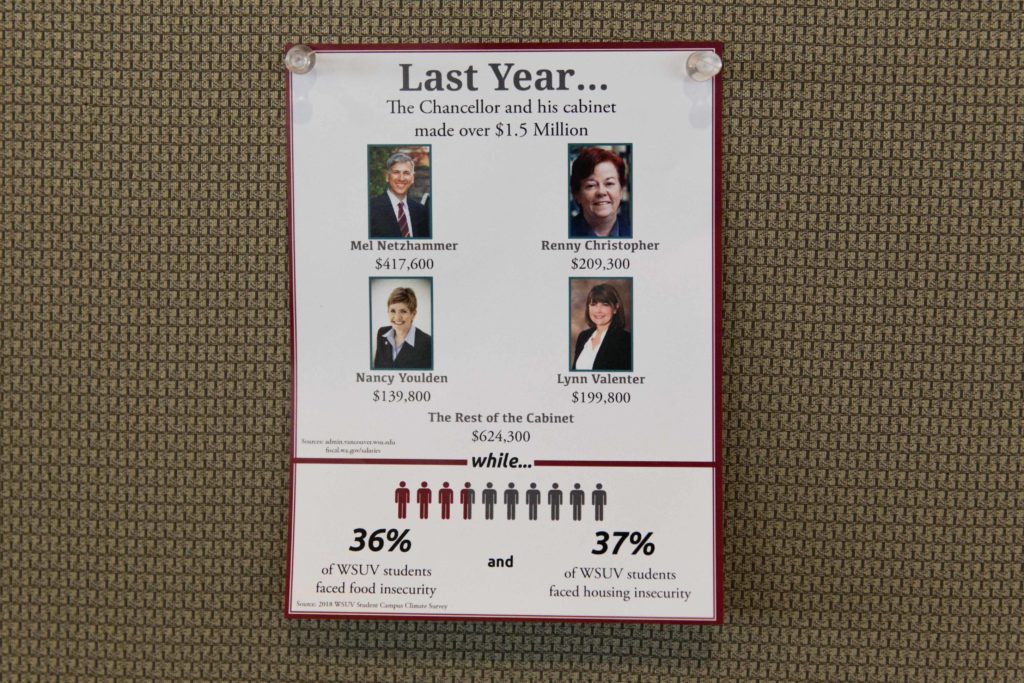By Scott McCully
Editor’s note: While this student’s reporting is independent of the Edward R. Murrow College of Communication, we would like to thank the Integrated Strategic Communication program at WSU Vancouver for inviting its journalism students to contribute to The VanCougar Newsmagazine.
Last November, flyers listing the salaries of the WSU Vancouver chancellor, Mel Netzhammer and the three top earning members of his cabinet were posted on bulletin boards campus wide. Also on the flyers, the salaries contrasted the percentages of WSU Vancouver students who reported being food and housing insecure on the 2018 Campus Climate Survey. The flyers were promptly removed.
The salaries of Netzhammer and his cabinet are public record, given their positions as public officials. Currently, it is still unknown who posted the flyers or why they were removed from the campus bulletin boards. Since the removal of the flyers, instructors around campus have agreed to hand out the same flyers to show of support for the concerns about the salaries of the chancellor and his top cabinet officials that the posters addresses.
Desiree Hellegers, associate professor of English, saw the removal of the potentially student-made flyers as a failure of the administration to address the concerns of the student body.
-Desiree Hellegers
“We are refusing to engage in an important intellectual discussion and debate about the running of the University.”
“When students are asking critical questions about administrative salaries, why is the administration reluctant to engage those questions?” Hellegers said.
Hellegers, who has displayed the flyer in her classroom, expressed concerns that by removing the flyers, the school is failing in its mission to facilitate open debate. “We are refusing to engage in an important intellectual discussion and debate about the running of the university,” she said.
The flyers circulated amidst a time of growing concern over the increasing cost of college tuition. According to a Forbes article, “Price Of College Increasing Almost 8 Times Faster Than Wages” by Camilo Maldonado, the average cost of tuition has increased eight times faster than wages. Additionally, student loans now make up the majority of non-mortgage debt in the United States.
According to Debt.org, the cost of tuition at public universities has increased 344% since 1980. It comes as no surprise that the cost of attending college has made it increasingly difficult for young people looking to earn a degree.
Hellegers explained the ever increasing financial burden placed on students is another reason that she agreed to make the flyers available in her classroom. “I think it’s clear, students today have to struggle much harder to complete a degree,” she said.
While tuition at colleges across the country have increased dramatically, so too have administrator salaries. According to a report by the College and University Professional Association for Human Resources which was cited in a TIME article, “College Presidents Rake in Big Perks on Top of High Salaries,” the average salary for a college president is $450,000. Netzhammer’s 2017 salary was just under $418,000.
Reports also show the average annual salary of top college officials has increased 2.2% over the last year.
Contrasting a trend of increased administrative salaries, the 2018 WSU Vancouver Student Campus Climate Survey revealed that 36% of Vancouver students are food insecure and 37% are housing insecure. The flyer reflected these statistics in a visual representation underneath the cabinet officials salaries.
As student wallets are stretched further and further, questions about the high salaries of college administrators are being brought up. “Is it appropriate that food and housing insecure students should be subsidizing these kinds of lifestyles?” Hellegers questioned.
